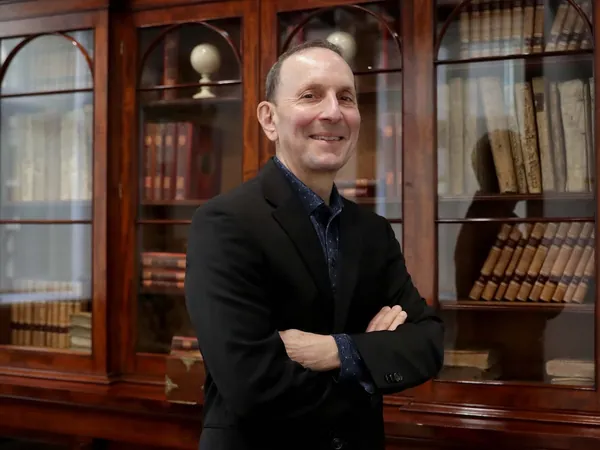
Meet Daniel Drucker: The Scientist Behind Ozempic's Global Phenomenon
2025-07-20
Author: Benjamin
At 68, Daniel Drucker stands at the forefront of medical science, blending humor and humility. Chatting at the BBVA Foundation in Bilbao, Spain, the Montreal-born endocrinologist prepares to accept the prestigious Frontiers of Knowledge Prize, a testament to his groundbreaking research.
As the son of Holocaust survivors, Drucker’s personal history resonates as deeply as his professional achievements. Now a professor at the University of Toronto, his work on glucagon-like peptide (GLP-1) has revolutionized the treatment of obesity and diabetes—significantly impacting millions worldwide.
The Unexpected Rise of Ozempic
The diabetes medication Ozempic, developed thanks to Drucker and his colleagues, garnered attention in 2022 as Hollywood's unexpected source of weight loss. This phenomenon transformed Novo Nordisk, the company behind Ozempic, into Europe's most valuable firm, igniting conversations around health and aesthetics.
Drucker's Views on the Hype
Drucker acknowledges the overwhelming buzz surrounding his discovery. "Ozempic is everywhere—from stores to sports events to the TV. It's fascinating how this drug has integrated into pop culture. Yet, it's also a platform to unveil the importance of scientific advancements, especially for people battling obesity. However, we must be cautious of the myths that cloud public discourse."
Understanding the Obesity Epidemic
Reflecting on the obesity crisis, Drucker emphasizes its roots are complex and multifaceted. "In my youth, starvation dominated global concerns. Today, obesity poses a greater threat in many regions. Our genetics remain unchanged—what has shifted is our environment, societal norms, dietary habits, and exposure to chemicals. We must better understand these dynamics to effectively combat obesity instead of merely treating it."
Weight Loss vs. Health Benefits
Drucker's research debunks the myth that those with obesity simply lack willpower, instead highlighting biological signals that fail to regulate appetite. Interestingly, while Ozempic is typically approved for diabetes management, not weight loss, recent studies indicate its broader health benefits—including reduced risks of heart attacks and strokes.
"The SELECT trial revealed significant reductions in heart-related issues with semaglutide use, underlining the importance of addressing obesity as a serious health condition," he explains. The results advocate for reconsidering coverage for weight loss treatments, presenting a case for preventive care in the modern healthcare landscape.
The Mechanisms Behind GLP-1
Drucker's meticulous research shows that the advantages of GLP-1 extend beyond weight loss. Animal studies reveal that even non-obese individuals can experience heart and kidney health improvements. As scientific understanding evolves, the conversation about the therapeutic potential of GLP-1 continues to expand.
Cravings, Addiction, and GLP-1's Role
Fascinatingly, initial findings suggest that GLP-1 may also mitigate cravings for substances beyond food. Drucker believes the drug alters the brain's reward response, reducing pleasure derived from eating and potentially other addictive behaviors. However, more rigorous studies are needed to establish these effects.
A Cautious Approach to Prescribing GLP-1
Drucker advocates for research-backed prescribing practices. "I'm conservative by nature. If asked about prescribing GLP-1 for non-diabetic individuals seeking to lose weight, I’d insist on clinical trials to ascertain safety and efficacy. While our experience spans over two decades, it's essential to gather specific data on these new applications."
Looking Toward the Future
Drucker worries about a future dominated by pharmaceutical fixes for conditions like obesity and diabetes. "We must not lose sight of the root causes. If a simple, cost-effective solution exists, that should take precedence over long-term reliance on drugs. Continued research on obesity is not just beneficial; it's crucial."
In Drucker’s world, science not only drives innovation but also cultivates hope—transforming lives one breakthrough at a time.









 Brasil (PT)
Brasil (PT)
 Canada (EN)
Canada (EN)
 Chile (ES)
Chile (ES)
 Česko (CS)
Česko (CS)
 대한민국 (KO)
대한민국 (KO)
 España (ES)
España (ES)
 France (FR)
France (FR)
 Hong Kong (EN)
Hong Kong (EN)
 Italia (IT)
Italia (IT)
 日本 (JA)
日本 (JA)
 Magyarország (HU)
Magyarország (HU)
 Norge (NO)
Norge (NO)
 Polska (PL)
Polska (PL)
 Schweiz (DE)
Schweiz (DE)
 Singapore (EN)
Singapore (EN)
 Sverige (SV)
Sverige (SV)
 Suomi (FI)
Suomi (FI)
 Türkiye (TR)
Türkiye (TR)
 الإمارات العربية المتحدة (AR)
الإمارات العربية المتحدة (AR)